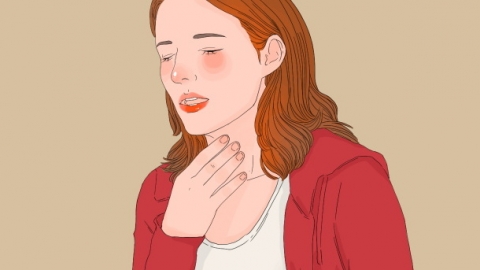What causes dry mouth and thirst after drinking alcohol?
Feeling dry mouth and thirst after drinking alcohol may be caused by the diuretic effect of alcohol, irritation of oral mucosa, gastritis, Sjögren's syndrome, diabetes, etc. Symptoms can be improved through rehydration, dietary adjustments, and medication. If dry mouth persists or is accompanied by excessive drinking, frequent urination, or stomach discomfort, medical attention should be sought promptly.
1. Diuretic effect of alcohol: Alcohol accelerates kidney metabolism, leading to increased urination and fluid loss in the body, resulting in dry mouth and thirst. It is recommended to drink warm water in small amounts frequently during and after alcohol consumption to replenish fluids. Avoid strong tea or coffee, which may worsen dehydration.
2. Oral mucosal irritation: Alcohol irritates the oral mucosa and reduces saliva secretion, causing dryness in the mouth. After drinking, rinse your mouth with warm water and consume water-rich fruits such as pears and watermelons to relieve mucosal irritation.

3. Gastritis: Alcohol irritates the gastric mucosa, causing inflammation and impairing digestive function, which indirectly leads to dry mouth, often accompanied by stomach pain and bloating. Follow medical advice to take medications such as omeprazole enteric-coated capsules, hydrotalcite chewable tablets, and domperidone tablets to alleviate symptoms.
4. Sjögren's syndrome: An autoimmune disorder that impairs salivary gland function, further reducing saliva secretion after alcohol consumption and worsening dry mouth, often accompanied by dry eyes. Under a doctor’s guidance, use medications such as sodium hyaluronate eye drops, hydroxychloroquine tablets, and total glucosides of paeony capsules to improve symptoms.
5. Diabetes: Alcohol affects glucose metabolism. Diabetic patients may experience blood sugar fluctuations after drinking, exacerbating dry mouth, along with symptoms like frequent urination and weight loss. Under medical supervision, use medications such as metformin sustained-release tablets, insulin injection, and gliclazide tablets to manage symptoms.
Daily care includes limiting alcohol intake to avoid excessive drinking, promptly rehydrating after drinking to keep the mouth moist, eating a light diet rich in fresh vegetables and fruits, and maintaining regular作息 (daily routines) to support stable metabolic function.








